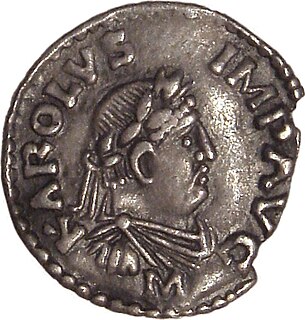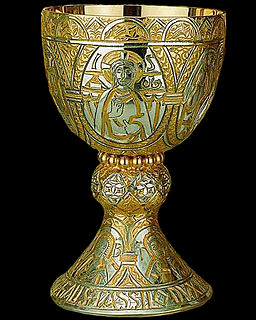
Charlemagne or Charles the Great, a member of the Carolingian Dynasty, was King of the Franks from 768, King of the Lombards from 774, and the first Holy Roman Emperor from 800. Charlemagne succeeded in uniting the majority of western and central Europe and was the first recognized emperor to rule from western Europe since the fall of the Western Roman Empire around three centuries earlier. The expanded Frankish state that Charlemagne founded was known as the Carolingian Empire. He was canonized by Antipope Paschal III— an act later treated as invalid—and he is now regarded by some as beatified in the Catholic Church.

Charles Martel was a Frankish political and military leader who, as Duke and Prince of the Franks and Mayor of the Palace, was the de facto ruler of Francia from 718 until his death. He was a son of the Frankish statesman Pepin of Herstal and Pepin's mistress, a noblewoman named Alpaida. Charles, also known as "The Hammer", successfully asserted his claims to power as successor to his father as the power behind the throne in Frankish politics. Continuing and building on his father's work, he restored centralized government in Francia and began the series of military campaigns that re-established the Franks as the undisputed masters of all Gaul. According to a near-contemporary source, the Liber Historiae Francorum, Charles was "a warrior who was uncommonly [...] effective in battle".
The 740s decade ran from January 1, 740, to December 31, 749.

Year 741 (DCCXLI) was a common year starting on Sunday of the Julian calendar. The denomination 741 for this year has been used since the early medieval period, when the Anno Domini calendar era became the prevalent method in Europe for naming years.

Carloman was the eldest son of Charles Martel, majordomo or mayor of the palace and duke of the Franks, and his wife Chrotrud of Treves. On Charles's death (741), Carloman and his brother Pepin the Short succeeded to their father's legal positions, Carloman in Austrasia, and Pepin in Neustria. He was a member of the family later called the Carolingians and it can be argued that he was instrumental in consolidating their power at the expense of the ruling Merovingian kings of the Franks. He withdrew from public life in 747 to take up the monastic habit, "the first of a new type of saintly king," according to Norman Cantor, "more interested in religious devotion than royal power, who frequently appeared in the following three centuries and who was an indication of the growing impact of Christian piety on Germanic society".

Neustria was the western part of the Kingdom of the Franks.

Childeric III was King of Francia from 743 until he was deposed by Pope Zachary in March 751 at the instigation of Pepin the Short. Although his parentage is uncertain, he is considered the last Frankish king from the Merovingian dynasty. Once Childeric was deposed, Pepin the Short, who was the father of emperor Charlemagne, was crowned king, initiating the Carolingian dynasty.
Under the Merovingian dynasty, the mayor of the palace was the manager of the household of the Frankish king.

Francia, also called the Kingdom of the Franks, Frankish Kingdom, Frankland or Frankish Empire, was the largest post-Roman barbarian kingdom in Western Europe. It was ruled by the Franks during Late Antiquity and the Early Middle Ages. After the Treaty of Verdun in 843, West Francia became the predecessor of France, and East Francia became that of Germany. Francia was among the last surviving Germanic kingdoms from the Migration Period era before its partition in 843.
Grifo, Duke of Maine (726–753) was the son of the Frankish major domo Charles Martel and his second wife Swanachild.

Bertrada of Laon, also known as Bertrada the Younger or Bertha Broadfoot, was a Frankish queen. She was the wife of Pepin the Short and the mother of Charlemagne, Carloman and Gisela, plus five other children.

Pepin or Pippin, born Carloman, was the son of Charlemagne and King of the Lombards (781–810) under the authority of his father.

Pepin the Short, also called the Younger was King of the Franks from 751 until his death in 768. He was the first Carolingian to become king.

Tassilo III was the duke of Bavaria from 748 to 788, the last of the house of the Agilolfings.
Odilo, also Oatilo or Uatilo of the Agilolfing dynasty was Duke of Bavaria from 737 until his death. He had the Lex Baiuvariorum compilation edited, the first ancient Germanic law collection of the Bavarians.
Rotrude (Chrodtrudis) was the first wife of Charles Martel, Mayor of the Palace and de facto ruler of Francia from 718 to 741. She was the mother of Pepin the Short, King of the Franks, and therefore the grandmother of Charlemagne. Rotrude is believed to be the daughter of Lambert, Count of Hesbaye, although this designation is not without controversy, as discussed below. She is also referred to as Rotrude of Treves.
The siege of Bourbon was a Frankish siege of the Aquitanian fortress of Bourbon in 761 during the Aquitanian War. The Frankish army under King Pepin the Short invested, stormed and burned the fortress, taking the garrison prisoner.
The siege of Bourges was a Frankish siege of the Aquitanian fortress town of Bourges in 762 during the Aquitanian War. The Frankish army under King Pepin the Short invested the fort with lines of circumvallation, contravallation and siege engines. The walls were breached and the fort taken. Count Chunibert of Bourges swore his loyalty to Pepin along with his Gascon levies and their families. Pepin appointed several counts of his own to garrison the place and the Frankish army went on to besiege Thouars.
The siege of Thouars was a Frankish siege of the Aquitanian stronghold of Thouars in 762 during the Aquitanian War. The Frankish army under King Pepin the Short besieged and captured the fort with great speed, burning the place to the ground, taking the count of Thouars captive and deporting him and Thouars' Gascon levies to Francia.
The siege of Toulouse was a Frankish siege of the Aquitanian fortified town of Toulouse in the winter of 767 during the Aquitanian War. The Frankish army under King Pepin the Short conquered the town and accepted the surrender of nearby Albi and Gevaudan.